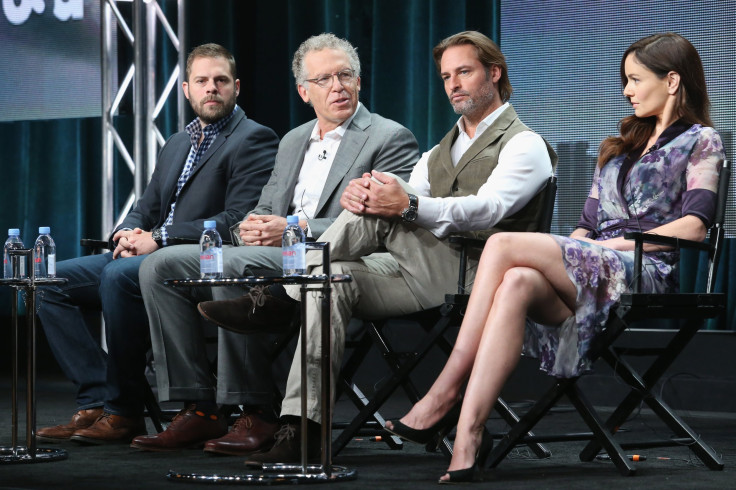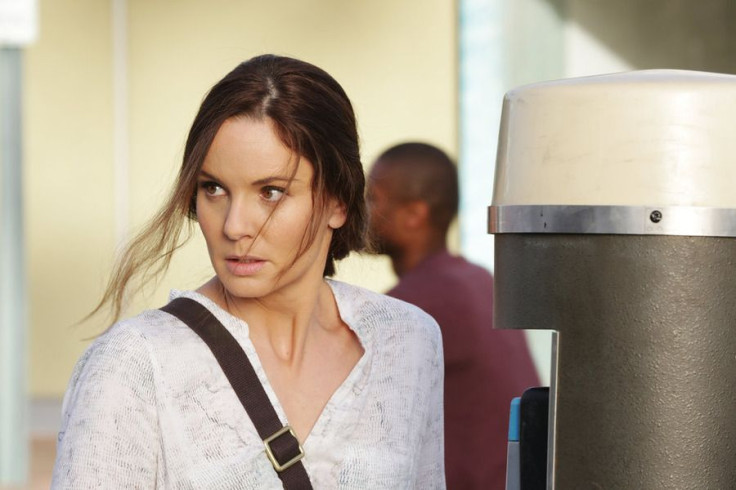'Colony' EP Carlton Cuse On 'Lost' Comparisons, Josh Holloway's Movie Star Charisma, And Those Aliens

"Mr. Robot" just won the Golden Globe for Best Drama Series and USA is officially among the ranks of the prestige cable networks. For their next trick, they have enlisted a serious heavyweight, "Lost" executive producer Carlton Cuse, to deliver a worthy follow up with "Colony." They have also given Cuse a secret weapon — former "Lost" star Josh Holloway, who played Sawyer in the iconic ABC series.
Inspired by stories of Nazi collaborators in World War II-era France, Cuse and co-creator Ryan Condal set "Colony," which premieres Jan. 14, in a not-so-distant-future Los Angeles where mysterious (alien?) invaders showed up and sectioned off the city into strictly monitored blocs. Holloway plays former Army ranger and expert fugitive-finder Will Bowman, a man pretending to be a lowly mechanic named Billy Sullivan to keep a low profile and any targets off of his family's back. After Bowman makes an attempt to rescue his son, who ended up separated from his family after the "arrival," he gets wrapped up in the dangerous battle between "the resistance" and the human "collaborators," who force him to use his particular set of skills to hunt down "the resistance" for the mysterious celestial subjugators.
Cuse, who has also created and/or executive produced "Bates Motel," "The Strain," and "The Returned" since "Lost," spoke with International Business Times ahead of the "Colony" premiere about working with Holloway again, with whom he says he has "a literal and emotional shorthand," and explain the human drama behind the mysterious alien occupation in the show.
Watch the trailer for "Colony" below:
International Business Times: You seem to be leaning into the “Lost” shadow with “Colony” more than any of your other post-”Lost” projects. Is that because comparisons with “Lost” are inevitable when you are working with Josh, or is there something about this show you think will connect with the “Lost” fan base in particular?
Carlton Cuse: I think it is inevitable because of my history with Josh and the fact that we did “Lost” together. I think that the biggest similarity is you have characters operating in a world where they don’t have a lot of answers and they don’t know what’s going on. Unlike “Lost” the mysteries of this world are not central to what the show is ultimately about. We’ll find out over time what these sort-of alien invaders are doing here and what’s the state of the rest of the world and those things will be revealed. The ultimate dramatic issue for the show is will this family survive and how do they navigate a world that has been completely upended.
IBT: It struck me watching that pilot that Will Bowman (Holloway) is a pure hero with noble intentions to help his family, but there is an inherent sense of danger with Josh Holloway because he is so iconic as Sawyer, almost as if we are waiting for him to become an anti-hero. Are you conscious of playing with audience expectations like that?
Cuse: I think every actor brings something inherent to the table that is similar movie to movie. Whether you watch Jimmy Stewart or Humphrey Bogart or John Wayne, there are some essential qualities to their humanity that shine through in their performance even if they are playing different characters. I think that is true of Josh as well, but this character is a lot different than Sawyer. Sawyer was a very dark character who was out for himself and over the course of time learned how to connect with someone in a deep and honest way through his relationship with Juliet (Elizabeth Mitchell).
Will Bowman is a family man who has had a legitimate job all his life, so he is much more an established, reputable, reliable person and he is trying to figure out how to hold this family together. With that said, he is a little bit of a rebel in terms of process and a bit of a nonconformist, but he is not an exile in the way Sawyer was in “Lost.”
IBT: It is interesting that you bring up those classic movie stars, because I think Josh has that same charisma where there is always a little bit of him no matter what character he is playing.
It reminds me of Henry Fonda in “Once Upon a Time in the West” where, because this iconic good guy is playing such a despicable villain, it is so jarring and almost more dynamic. I felt the same watching Josh in “Colony,” where Will is a purer character starting from the light and being dragged into the dark, but because he is Sawyer, there is another dimension to it.
Cuse: Neither Josh nor I wanted to repeat a carbon copy of [Sawyer]. So, while there is still a certain irascible charm to the character he is starting the show in a very different place, but there will be a lot of places he will go across the series. We didn’t start the show in a super dark and dystopian place. Yes, there are 300-foot walls around Los Angeles, but it is a pretty pleasant, benign place so far and that was a very intentional decision.
IBT: I thought Sarah Wayne Callies, who plays Will’s wife Katie, stole the show in the pilot. Her scenes are the ones that seem more like normal Los Angeles, but you can see the dread about what is going on in her face. How did she come on board?
Cuse: Sarah got a hold of the script and chased us down and once [co-creator Ryan Condal] saw her audition we were like, “Oh my God, she is fantastic.” That was really it. She honed in and wanted the role and I think was smart about seeing this as a great fit for her talents. It was not as though we had someone in mind in particular. We always had Josh in mind for Will, because I knew I wanted to work with him again, but we did not talk about who Katie was. We were trying to see who was out there and Sarah came after the part and it was really simple once we saw her. She was this fantastic gift that came and fell in our laps

IBT: Since you mentioned it was very intentional, what was the thought process behind being so restrained with the more dystopian elements of the show? A lot of the series, at least early on, feels just like normal Southern California life.
Cuse: I think the idea was just to give us someplace to go. I think so many stories that are in this sci-fi genre start in this really dark and miserable place. They are closer to “Blade Runner” or “The Road.” The idea was to not do that, to figure out a way to illustrate the fact that there is weirdly some things that are beneficial in a totalitarian society. There is sort of a certainty and safety. There is no street crime. You can take a bus across the city in six minutes. Those are things that, when you read about people who grew up in East Germany, for instance, there were certain things that were valued despite living in this oppressive regime.
The Nazi-occupied Paris example for us was informative in that, by and large, for a huge number of Parisians, life just went on. There are pictures of people sitting in these cafes drinking espressos while Nazi storm troopers marched by them in the street. It is a very conscious decision that can be made by a proxy government about how beneficial is it to be oppressive to the people you are occupying. What we will see with Proxy Snyder (Peter Jacobson) is he makes a decision that if people are given the basic necessities that make life good for them then they are less likely to cause problems. For all of his malevolent bluster early on, we come to find out in the series that he sort of trying to have this enlightened attitude about how he is governing. The question is, will it work?
IBT: What led to the decision to have the occupation be this supernatural power? I know you have shied away from overtly calling them aliens.
Cuse: Basically, we wanted to find a way to do a story about colonization in a modern context and doing it with science fiction seemed like the way to go. Good science fiction is always allegorical and we wanted to find a way to bring these issues home, especially for an American audience. The alien occupiers are really more of a condition, though. We don’t see them and they have installed this proxy government, so that is not what the show is really about.
IBT: With refugee issues so prominent in the news lately and certain leaders in the country debating building a wall on the southern border not unlike the one in “Colony,” the show feels alarmingly relevant to a lot of contemporary issues, as well as the colonization and Nazi inspirations.
Cuse: You mean, like Donald Trump?
IBT: Well, yeah. Do you see those connections?
Cuse: I mean, yeah, I would hope that as we make the show there a lot of ways people will connect to it. I got an email the other day from a friend of mine who had gotten an email from a friend of his in Egypt talking about the scene in the pilot where they are sitting in a cafe and security forces drive up and grab another patron in the cafe and haul him into the car and drive away. The person in Egypt said that he had witnessed that happen in a cafe right next to him. My hope is that a lot of the things that happen in “Colony” have a connectedness to the world around us.
IBT: Do you have an ending planned in your head yet?
Cuse: Yeah … there is a general plan for how we see the show unfolding. As for exactly how many seasons that will be, it’s a little too early to tell. But Ryan and I have been talking about this for two years, so we have talked about a lot of stuff and there is a clear arc for us for how the show unfolds and it is more of a question of how fast that will happen.
IBT: Are you willing to say if fans will ever see the “aliens”?
Cuse: Well, yeah. I don’t want to say when, how, or to what extent, but … yes.
"Colony" premieres Thursday, Jan. 14, at 10 p.m. EST on USA.
© Copyright IBTimes 2024. All rights reserved.






















